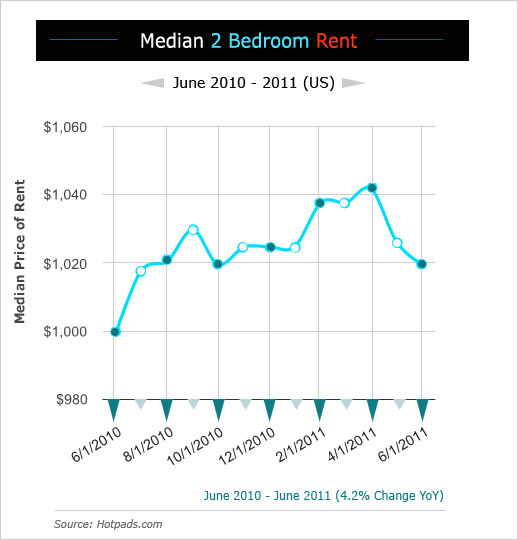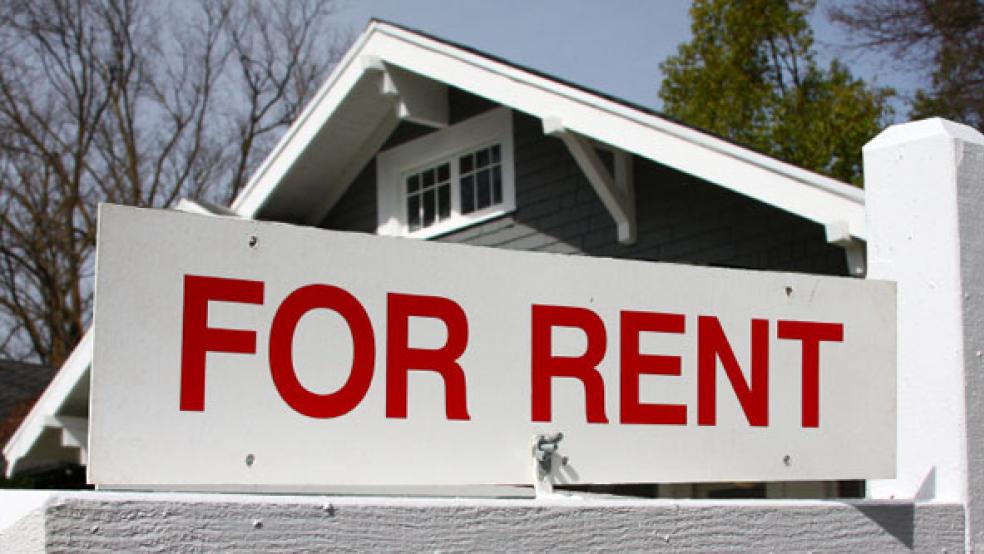Call it the Big Selloff—America is headed toward a future in which fewer people own the spaces they call home. The effective homeownership rate , which excludes borrowers whose homes are underwater, stands at 62 percent, down from 69 percent in 2006, according to a 2010 report by the New York Federal Reserve. ![]()
As more people move from owning to renting, apartment vacancy rates have fallen fast, from 8 percent in 2009 to 5.6 percent in third quarter 2011. That’s pushed up rents in all markets by 2.5 percent, including apartments and single-family homes, to an average of $846 nationwide, according to Local Market Monitor, a home price forecaster. For a two-bedroom dwelling, the average rent was at $1,020 in June 2011.
Those trends are just the beginning, concludes a July report from investment bank Morgan Stanley: the United States is becoming a nation of renters and home ownership will keep falling. And that, say some experts, could be good for the country.
This dramatic change, triggered by the 2008 housing collapse, has shifted people’s views of home ownership. The number of those who consider a home a safe investment fell from 83 percent in 2003 to 66 percent this year, according to a survey by Fannie Mae and two other organizations. In another poll last April, commissioned by real estate data firms RealtyTrac and Trulia, 40 percent of renters questioned said they plan never to buy a home. Another reason—baby boom retirees who don’t want the burden of home repairs, rising property taxes and other responsibilities.

Laura Seitz, 60, is another former homeowner who doesn’t want to own again. She bought her house in west Los Angeles in 1998. But last year a burst pipe in the house caused $18,000 in damage and she lost her job, so she decided to sell. Living in a desirable neighborhood helped her—she got 10 percent more than the asking price. Even so, she says that “the burden of owning and caring for a home as a single woman was weighty, much more than I had anticipated.” Now she rents in the same neighborhood and says, “it’s a great feeling to be liberated.”
She may be onto something: many experts now challenge the conventional wisdom that owning is a necessarily a sound life choice. Forbes contributor James Altucher argues that buying a home is a trap—houses are illiquid investments that drain their owners’ time, energy, and cash and force them to stay put. Another skeptic is Yale economist Robert Shiller, co-creator of the Case-Shiller Home Price Index. He compiled data in 2006 showing that between 1890 and 2004, the return on investing in houses was just 0.4 percent a year—a period when the stock market grew at 9.6 percent annually. And in a paper this June in the journal Real Estate Economics, two researchers calculated that over the past 30 years, most often it would have been better to rent than buy. Renters who invested in stocks and bonds instead of home equity came out ahead 75 percent of the time.
Richard Florida, author of the best-selling The Rise of the Creative Class, argues that a high homeownership rate isn’t just bad for individuals—it hurts the economy too. The modern global marketplace requires workers who are mobile, but those who have homes can’t sell quickly and move to take advantage of opportunities, says Florida in his latest book, The Great Reset. That conclusion is backed by a study released in September by the National Bureau of Economic Research, which reported that homeowners whose mortgages exceed the value of their houses are 30 percent less likely to move.
Developers are betting that the trend away from owning will continue. Construction of multi-family houses with at least two units increased by more than 30 percent in June, three times the rate of single-family homes, according to the Wall Street Journal. Apartment projects are taking off even in places hardest hit by the housing collapse. New York developer Barnet Liberman is building 240 apartments in downtown Las Vegas and is planning a 24-story, 1150-unit downtown building after that project is done. Both developments will target couples and families making $30,000 to $85,000—“people who want to exchange their lawn for a life,” says Liberman. In hard-hit south Florida, developers also are kicking off a new round of apartment construction, with plans for 4000 rentals in Fort Lauderdale, Hollywood, and Plantation.
It remains to be seen whether renters’ increasing numbers will translate into changes in government priorities that favor home buyers. In 2009, $230 billion in federal money was devoted to helping home owners through policies like the mortgage interest deduction and support for Fannie Mae and Freddie Mac—four times what was spent on improving rental affordability, according to the Congressional Budget Office. But the Morgan Stanley report cites evidence that the Obama administration is pulling back from past policies promoting ever-more homeownership. Recent policy pronouncements from the Treasury Department make clear that it is not the administration’s goal to have all Americans become owners.
Any reforms in the system of federal subsidies for owners are likely to be gradual, says Wayne Yamano, vice president of John Burns Real Estate Consulting, which tracks real estate trends. Changes like eliminating the mortgage interest deduction or funneling public money into Fannie Mae and Freddie Mac will be phased in over time, he says.
Were those to happen, they would level the playing field between homeowners and renters and likely drop the homeownership rate still further. In the eyes of reform advocates like Richard Florida, that would be welcome news. He cites Nobel prize-winning economist Edmund Phelps: “It used to be the business of America was business. Now the business of America is homeownership. To recover and grow again, America needs to get over its house passion.”





